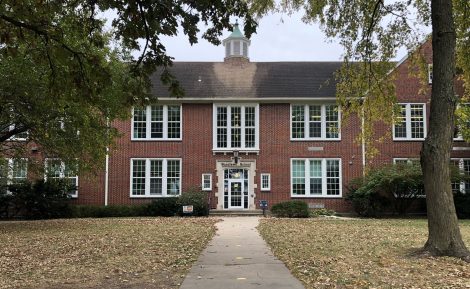Departing school board members offer thoughts on their tenures
The Lawrence school board is about to lose a majority of its members, their terms ending after four, eight, even 20 years of service.
Heading into their final meeting — set for 7 p.m. Monday at district headquarters, 110 McDonald Drive — here are some parting thoughts from Mary Loveland, Marlene Merrill, Rich Minder and Scott Morgan.
Mary Loveland
Service: 1987-2003; 2007-11
• Biggest accomplishment: “Finally convincing Lawrence we needed a second high school,” she said of voters approving a bond to finance construction of Free State High School, which opened in 1997. “I’m not saying that I did it. It was the biggest accomplishment of the Board of Education. I was definitely on the pro-second-high-school side.
“A very close second, or maybe a tie, would be the move to four-year high schools and (switching junior highs to) middle schools. I really think that’s really important for the education of our kids.”
• Biggest regret: “The fact that we still don’t have people understanding why more consistency in the size of our elementary schools is important for the educational program — so we can afford the educational program that Lawrence kids, families and parents all expect,” she said. Art, music and other “specials” teachers at smaller schools often must split their days between schools, something that can be alleviated by having schools large enough to have enough “specials” each day, in one place. “You’re paying professional educators to educate, not drive a car.”
• Looking forward: “One of the biggest things looming on the horizon is the resolution of how many elementary schools we’ll have, and where they’ll be located in central and eastern Lawrence.”
Marlene Merrill
Service: 2007-11
• Biggest accomplishment: “Building the full-day kindergarten program,” she said, which has expanded to all but four elementary schools since being eliminated entirely during budget cuts before she had taken office.
• Biggest regret: “Not being able to see through what happens with the (Lawrence Elementary School Facility Vision) Task Force information — and building what elementary ed will look like, particularly,” she said.
• Looking forward: “I think the board has a lot of challenges, one of which is the negotiated agreement with the teachers,” she said. “And another, as they look towards a bond issue, is making sure that our resources are used fairly and well, and not just expending money — like, say, in contingency (funds) — for things that really need to have a longer look.” Such savings accounts should be used for one-time expenses, not ongoing costs, she said.
Rich Minder
Service: 2003-11
• Biggest accomplishment: “That we have begun a process of reducing the achievement gap while raising achievement for all students,” Minder said. “We’re moving toward excellence for all students, while at the same time reducing the achievement gap, particularly between students of color and white students.”
• Biggest regret: “As far as I’m concerned, the biggest regret is the Legislature didn’t follow through with its responsibility to invest in public education properly,” he said, noting that a court decision requiring increased school spending had given educators hope. “Then, when the economy goes south, we’ve been backtracking ever since. That’s a big regret.”
• Looking forward: “What I look forward to is the time when you look at all of the data, you’re not going to be able to tell there is a difference in achievement of students based on their race or any other identifier,” he said. “You won’t be able to look and see: ‘Oh, that person is African-American; that would explain why the score on their assessment is lower than white students, or students with disabilities’ or whatever. I look forward to when we get there.”
Scott Morgan
Service: 1999-2003; 2007-11
• Biggest accomplishment: “I survived,” he said. “Does that count?”
Morgan lists three: “My small part” in hiring Rick Doll as superintendent; “taking money out of excess buildings” — five schools closed while he was on the board — “and putting that money back into the classroom”; and approving the placement of athletic fields at Lawrence High School.
“The athletics fields were something that was long overdue,” Morgan said. “There was a lot of pushback on that, but it will serve this community and kids very well for many years to come, helping to keep us in the Sunflower League.
“There was serious talk among the Sunflower League of booting us. The football and soccer fields were so bad, they felt like they were putting the kids at risk. They kept asking us when we were going to do something about it, so we did something about it.”
• Biggest regret: “The only real regret I have is that I wasn’t able to finish the ‘How many schools we’re keeping’ question,” he said. “We still need to get out of that question and get on to academic achievement.”
• Looking forward: “They’re going to have to deal with a fundamental change in how we operate because the economic reality is so different,” he said. “Public institutions are behind the curve in making the adjustments they need to make — city government, the university, certainly public schools. We don’t change, typically, because we don’t have to. New boards will have to because of the economic reality. It’s not necessarily a bad thing, but it’s just hard because they’ll really have to prioritize what they want to do.”







